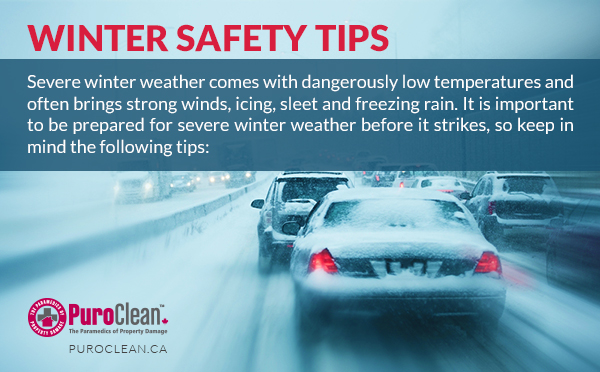The PuroClean Blog
Winter Safety Tips
 Severe winter weather comes with dangerously low temperatures and sometimes with strong winds, icing, sleet and freezing rain. Winter storms are “Deceptive Killers” because most deaths are indirectly related to the storm. Instead, people die in traffic accidents on icy roads and of hypothermia from prolonged exposure to cold. It is important to be prepared for severe winter weather before it strikes, so keep in mind the following tips:
Severe winter weather comes with dangerously low temperatures and sometimes with strong winds, icing, sleet and freezing rain. Winter storms are “Deceptive Killers” because most deaths are indirectly related to the storm. Instead, people die in traffic accidents on icy roads and of hypothermia from prolonged exposure to cold. It is important to be prepared for severe winter weather before it strikes, so keep in mind the following tips:
- Things to keep in the trunk of each car: a snow shovel, snow chains and some rock salt or other environmentally safe products to melt ice and snow, just in case the car gets stuck in snow.
- The windshield shouldn’t be deiced by pouring hot water on it – the old fashioned way: the ice scraper is much safer. The temperature difference between the hot water and a freezing car may crack the windshield.
- The car speed must be kept steady and below the speed limit when roads are icy or the threat of ice is imminent.
- When hitting a patch of ice, it is much safer to gently turn the steering wheel in the direction you are sliding and lightly tap the brake, instead of slamming on the brakes and overcorrecting.
- The curtains on south-facing windows should be kept opened to allow sunlight into the home, keeping it warmer.
- Frozen water pipes, should be deiced by applying heat slowly, beginning at the faucet and working towards the coldest section of the pipe. Using an electric heater to thaw frozen water pipes must be avoided, as it may lead to electrocution if something goes wrong.
- It is best to clear snow off roof by using a snow roof rake, instead of climbing onto the roof and risking damaging the structure of the roof and falling off.
- House gutters must be cleaned regularly. This will not only promote good drainage, but also help prevent ice damming. Ice damming occurs when water gets trapped and freezes when the temperatures drop.
- In case of a power outage, using kerosene heaters or any camping or barbecuing heating device must be avoided to prevent Carbon Monoxide (CO) poisoning.
- Bright sunshine reflecting off of snow can cause macular degeneration and even contribute to age-related eye disease, therefore sunglasses should be worn during winter too.
- A broad-spectrum sunscreen must be applied on the face and other exposed areas before going outside.
- Gloves must always be worn when working or playing outside to prevent frostbite, itchy, dry and cracked skin.
- When temperatures go down, multiple clothing layers, preferably made of wool or synthetic materials such as polypropylene, are recommended. Cotton can lead to hypothermia, especially after it gets wet.
Check back with us for more safety tips and don’t forget to follow us on Twitter, LinkedIn, Facebook and Google+ to get our notifications!
January 21, 2015